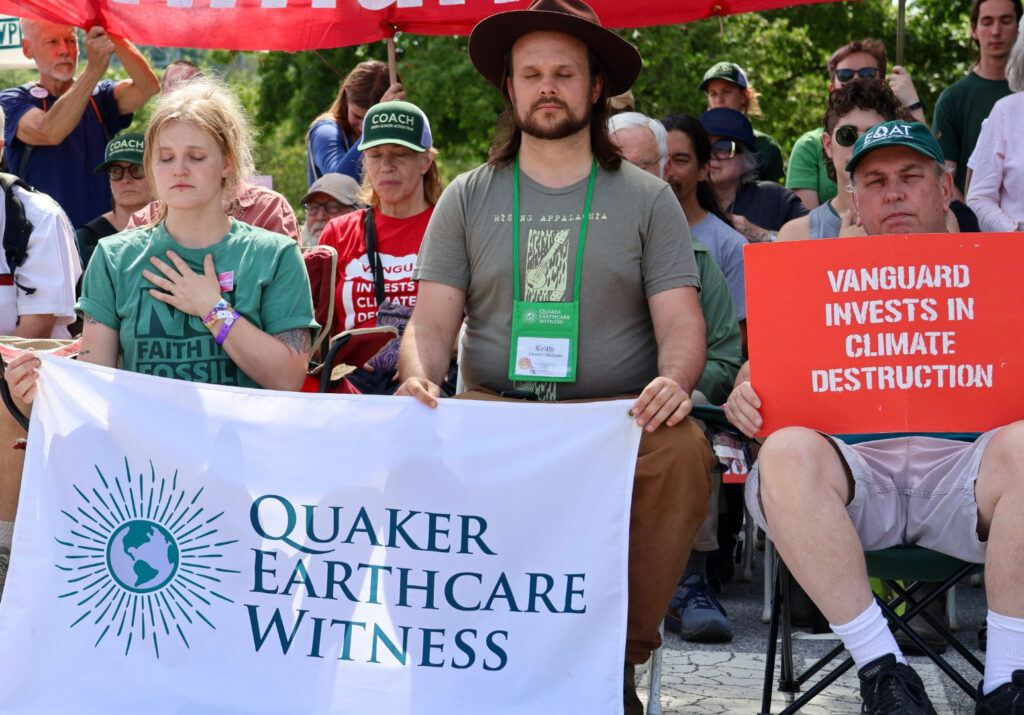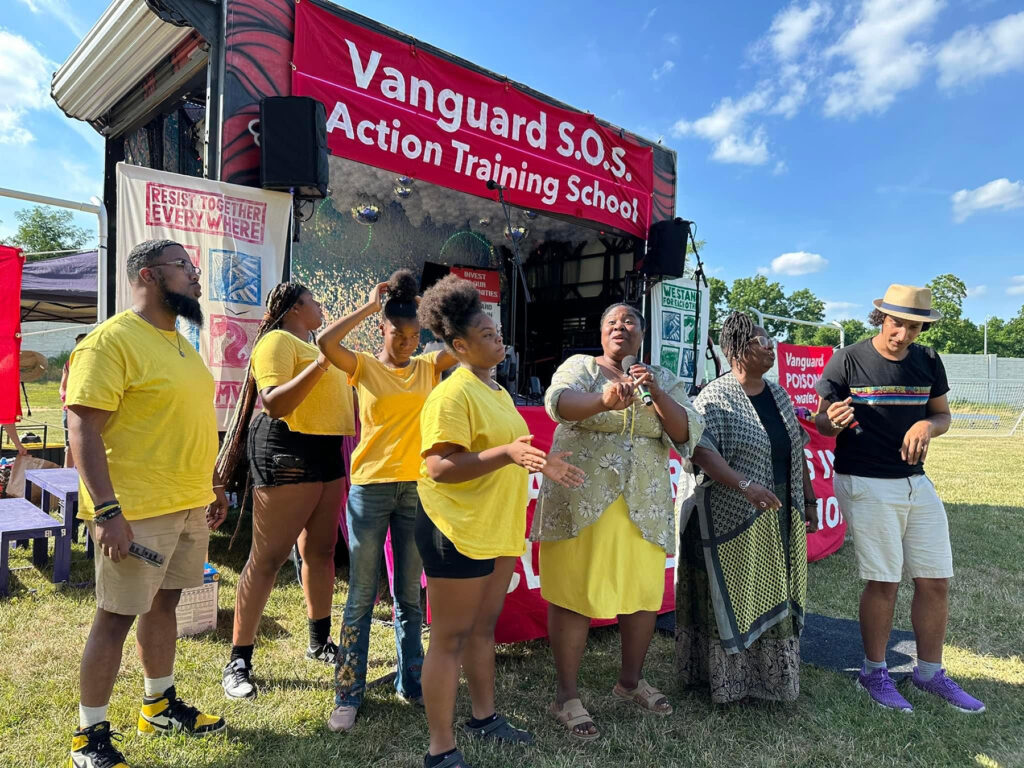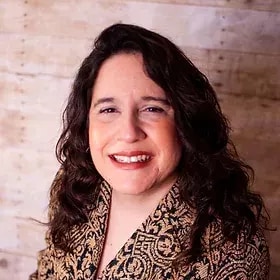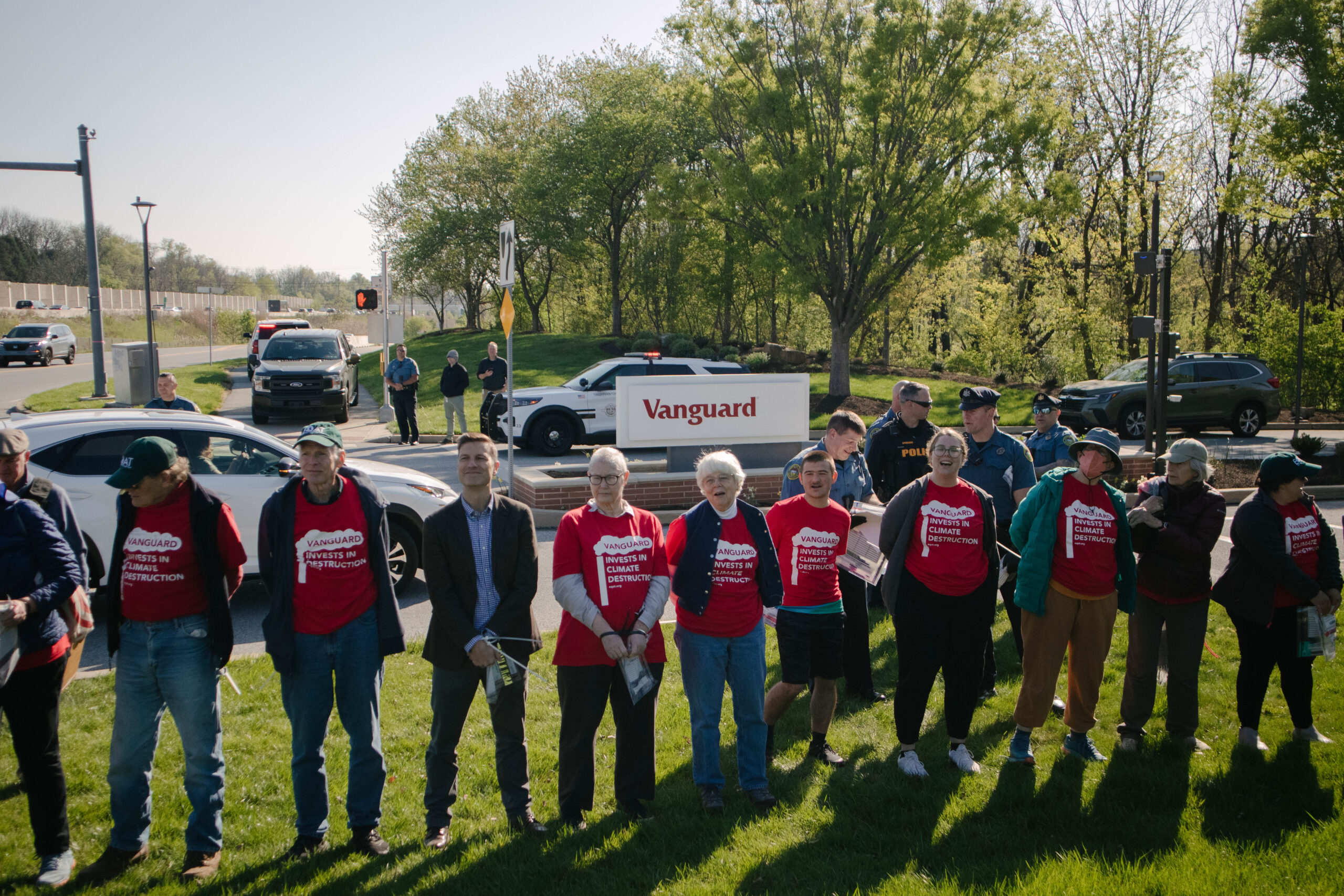On July 3, Earth Quaker Action Team (EQAT) organized a rally, march, and prayer vigil calling on Vanguard Group, a manager of retirement assets, to divest from all fossil fuel company holdings. The rally at Cedar Hollow Park outside Malvern, Pa., drew participants from the Friends General Conference (FGC) Gathering held in nearby Haverford, Pa. Demonstrators marched down the road from the park to an entrance of the company’s corporate campus, where a silent prayer vigil was held. About 300 people participated.
Activists called on incoming Vanguard CEO Salim Ramji, who took the helm of the company on July 8, to guide the firm away from fossil fuel investments.
“There’s a courageous course you could take that could change the company and could change history,” is what demonstrator Keith Runyan would like to tell Ramji.
Runyan participated in the demonstration with his partner and their four-month-old baby. He is the general secretary of Quaker Earthcare Witness.

Staff of Vanguard’s public relations department did not reply to an email seeking comment.
Planning the action to coincide with the FGC Gathering allowed EQAT to introduce Friends across the United States to the movement encouraging Vanguard to divest from its fossil fuel holdings, according to protestor Cherice Bock. Participants can return to their hometowns and continue to pressure Vanguard to divest.
Bock works as the climate policy manager at 350DPX, a Portland chapter of the national 350.org which persuaded the Oregon legislature to direct the state Treasury to divest from coal holdings that were part of public employee retirement funds. She is a member of North Valley Meeting in Newburg, Ore., and Sierra-Cascades Yearly Meeting of Friends.
Retirement funds with Vanguard and other investment firms support such projects as the Mountain Valley Pipeline and the East Africa Crude Oil Pipeline, Bock noted.
The Mountain Valley Pipeline transports natural gas from West Virginia to Virginia. The planned East Africa Crude Oil Pipeline is intended to carry oil from Uganda to Tanzania.
Hillary Taylor, a climate justice activist from Uganda who now lives in Boston, Mass., spoke at the demonstration about the impact of the East African Crude Oil Pipeline. Taylor described the project as rushed, motivated primarily by profit, and lacking adequate safety oversight, according to Runyan.
Bernadette “BJ” Lark, who talked about the Mountain Valley Pipeline, particularly impressed protestor Hannah Mayer, who attended with her three-year-old daughter. Lark is the founder of CommUNITY ARTS-reach in Roanoke, Va., and program organizer of Roanoke Democracy Center.
“It’s not that we are trying to make a better inheritance for our children. We are borrowing from their future right now,” Mayer said the speaker explained. Mayer works as the operations coordinator at Thee Quaker Project and is a board member of EQAT. She is a member of Lansdowne (Pa.) Meeting.
Speaker photos (top left to bottom left) by Ray Bailey. Bottom right: Photo by Rachael Warriner.
Containing the damage of climate change for children motivated other activists to join the protest. Montgomery Ogden is a high school English teacher at Friends’ Central School in Wynnewood, Pa. He participated in the demonstration out of concern for the future of his three-year-old child and another baby on the way.
“Part of the choice to parent in this age, for me, requires some commitment to climate action,” Ogden said.
Ogden attended Monteverde (Costa Rica) Meeting for two years and is a board member of EQAT.
In addition to parental concern, many demonstrators saw their activism as directly reflecting Quaker testimonies.

Bock believes protesting fossil fuel investment flows from a commitment to the peace testimony as militarization often occurs because countries want to control access to resources such as oil.
The U.S. military describes climate change as a “threat multiplier” because rising temperatures and more intense droughts will cause more conflicts over increasingly scarce water, Runyan noted. Out of commitment to the Quaker testimonies of peace and integrity, Runyan is motivated to work for a livable earth.
Mayer draws inspiration from the stewardship testimony that calls Friends to care for the earth and from the equality testimony that asks Quakers to protect the interests of people facing poverty. The integrity testimony also drives her to urge Vanguard officials to live up to their public image of being a people-first company by ceasing to invest in fossil fuel projects that harm humans and the earth.
Bock called on the company to broaden its concept of commitment to investors.
“Vanguard’s understanding of fiduciary responsibility needs to include long-term climate impacts. All the retirement money in the world cannot give us a comfortable retirement if it’s no longer possible to grow food due to extreme heat, floods, and other climate emergencies, or if the economy collapses due to instability from these climate crises,” Bock said.
Correction 8/1/24: A previous version of this article stated that demonstrators marched about a mile to the entrance of Vanguard’s corporate campus. In fact, they marched less than half a mile down the road from the park to one entrance of the corporate campus; there are multiple buildings on the campus and multiple entrances. The relevant sentence has been corrected.










Comments on Friendsjournal.org may be used in the Forum of the print magazine and may be edited for length and clarity.